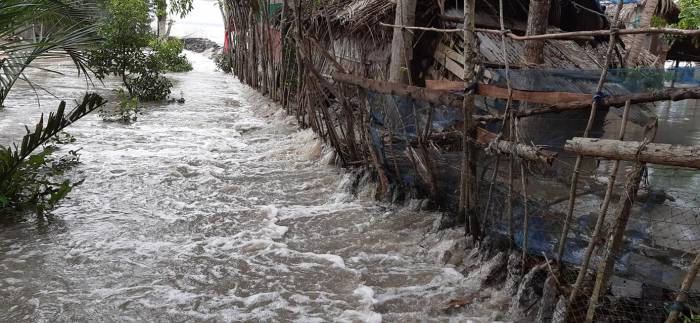
Cyclone Yaas, the second cyclone to ravage South Asia within a week, has made landfall. In Bangladesh, entire villages were submerged after floodwaters destroyed two river embankments. Two people died, and more than 1.1 million people evacuated from the storm’s path, all while South Asia continues to grapple with a surge in COVID-19 cases.
While cyclones are a regular occurrence in the Bay of Bengal, they are becoming more frequent and intense as climate change warms sea temperatures. A week after Cyclone Tauktae slammed into the western coast of India, Cyclone Yaas leaves behind another trail of destruction. Only a year ago, Super Cyclone Amphan caused widespread damage on India’s east coast, specifically West Bengal, Odisha, and Bangladesh. People on the coast face newer and more intense cyclones even before they can rebuild their lives from the previous one.
The river water has risen due to the effect of cyclone ‘Yaas’. Village after village on the coast of Bangladesh is sinking by breaking the embankment.#CycloneYaas #YaasBangladesh #CycloneAlert @GretaThunberg @FFFinBD @Greenpeace @UNEP @SohanBMYP @shahin_billah pic.twitter.com/NQShbYVtQO
— Shakil Hosen (@shakilhosenbd) May 26, 2021
#CycloneYaas: Cyclone-ravaged village of Samai Basan near Mohona in East Midnapore district have houses completely inundated in flood waters triggered by Cyclone Yaas.
Villagers don’t even have access to drinking water as tube wells remain submerged in flood waters. pic.twitter.com/XrH92Sff2v
— Pooja Mehta (@pooja_news) May 27, 2021
While Bangladesh was not in the direct path of Cyclone Yaas, high waves still smashed through embankments and inundated villages, leaving many homeless for weeks to come. Thousands of people are still marooned.

Cyclone Yaas affected village in Bangladesh. Photo: Noor Alam SK
“My entire village is underwater. I am devastated. We have been calling for climate justice for years but the cyclones are only getting more frequent and more intense. We haven’t completed rebuilding from the previous cyclone when a new one rips apart all the work we’ve done. Each time a wound dries, we’re plagued with new ones. Sometimes I feel that the international community has abandoned us. They have left us to die slowly. But I will not stop. I will continue to call on our governments to fund a just recovery. This means no more fossil fuels, no more gas, and instead funding just and clean renewable energy solutions.”- Shahin Billah, Youthnet for Climate Justice
As super cyclones continue to wreak havoc even while countries in South Asia struggle to cope with the second wave of Covid-19, it is time that a Just Recovery is prioritised and the region moves towards a renewable energy system.


0 Commentaires